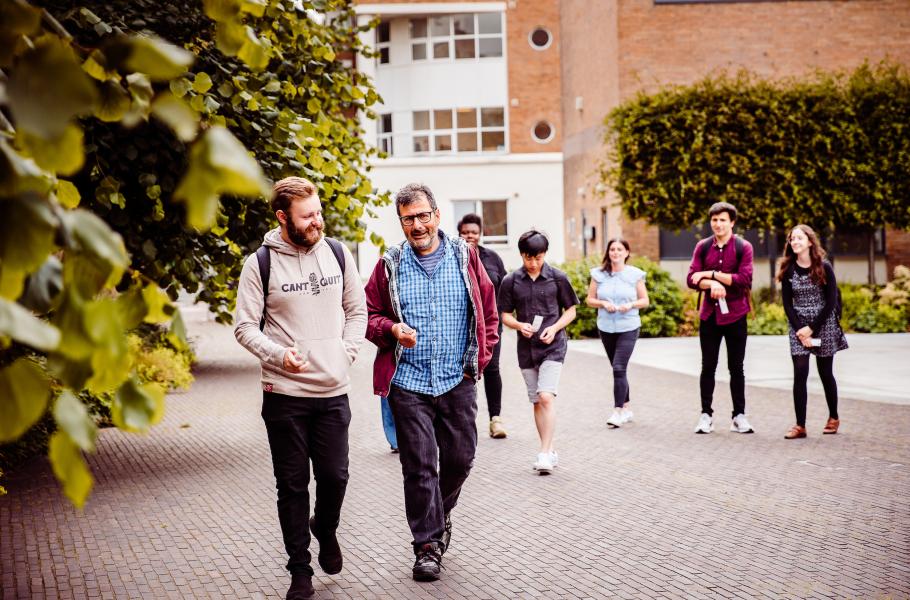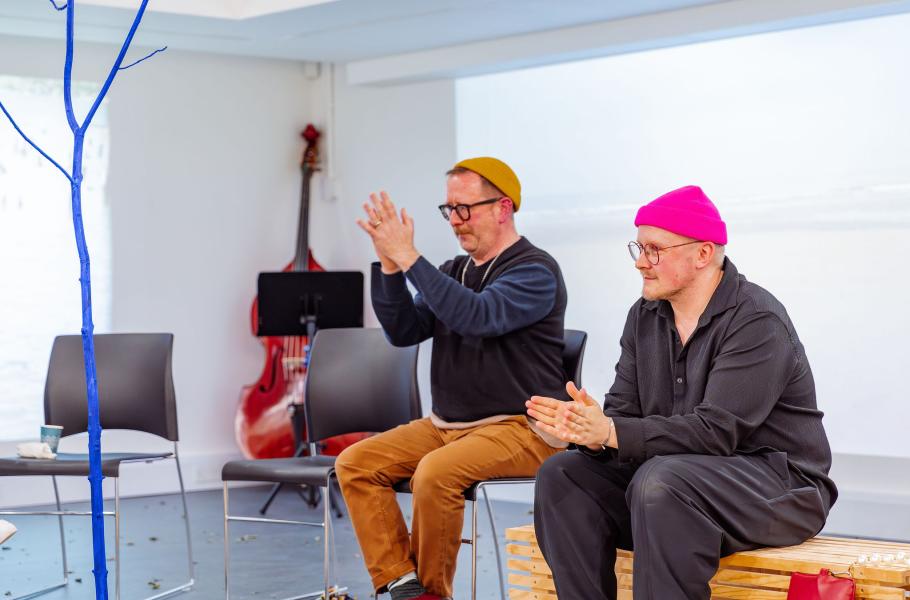life in the lower case
Alex McLean is co-artistic director of Zuppa, based in Nova Scotia, Canada and has been working with Lancaster Arts and many other partners over the last 3 years to bring This is Nowhere to Morecambe. Here Alex writes about his latest visit to our shores in June for LANDING.
Four months ago, we were flailed by wind and rain at The Battery on Morecambe’s promenade, considering ‘what connects us to nature.’ As participants in Lancaster Arts’ and We Live Here’s action-packed mini-festival LANDING (June 28-30), this theme was explored through commissioned artworks, a series of probing conversations and a number of participatory activities, such as talks, a pop up museum and lots of singing. Among these was my own ‘Embassy of Nowhere,’ at which I encouraged people to venture out in the town with a set of questions to inform how they experience their local environment. This simple exercise was, in part, a way to bridge the intentions of LANDING with those of This is Nowhere, my company’s ongoing project with Lancaster Arts in Morecambe, now slated for public performance in 2025. While LANDING’s focus was nature, This is Nowhere is about the built environment – the web of architecture, urban planning and social structures that inform our lives. So how are these projects related? Interestingly, experiencing LANDING helped me to understand This is Nowhere in ways I hadn’t before. I had a small but significant ‘aha’ moment as a result of the conversations that happened over the course of LANDING’s three days.

The Naturalist Fallacy
The ‘naturalist fallacy’ is the belief that the way things are (or were) is the way they are meant to be. We encounter this reasoning when social conservatives denounce evolving concepts of sexuality or gender. The same fallacy, though, creeps into a lot of environmental conversations when people talk of a quasi-sacred ‘natural balance’ or say things like, “we are destroying Nature.” Tempting though it may be to think this way, I believe it is a mistake.
How so? For one, the idea of capital ‘N’ Nature is slippery. The Earth, like the universe, is a place of bottomless complexity and interconnected processes. When we reduce this to a story of Civilization vs Nature, we reproduce the dangerous assumption of the industrial age: that ‘we’ are like gods, standing apart from the natural world. Even if we’re the bad guys – the sinners violating Nature – we are still privileging our own perspective. We’re still making the story all about us.
We can and should observe what’s around us and note when our behaviors have disastrous consequences. It’s just that this tells us nothing about what ought to be on some cosmic level. Clearly, along with our fellow mammals and countless other species, we require a certain balance of elements (oxygen, water, sunlight etc.), but that’s entirely different from suggesting that ‘Nature’ requires this balance. According to the geological record, ‘Nature’ has no such needs. Our planet was once covered in oceans of magma. Around 540 million years ago, the Cambrian Explosion drastically upended the entire biological order. When trees began growing around 400 million years ago, they drained CO2 from the Earth’s atmosphere, prompted mass extinctions, and then started burning, turning the planet into a fiery caldron. Wouldn’t it seem silly to say, ‘the trees destroyed Nature?” If we’re going to attribute a divine purpose to the natural world, how do we know that the countless periods of fire, flood and freezing aren’t part of that purpose? How do we know that creating the current climate crisis isn’t our role in this elaborate drama?
I think we’re better off without this sort of abstraction. We need to stave off environmental destruction for obvious reasons. For one, to not do so would be mass suicide. But it’s not just about our own survival. We have a deep feeling for the plants and creatures with which we share the planet (despite the fact that some of them end up on our dinner plates). How could we not feel such affinity? We’re like kids in a neighbourhood that grew up together. The Earth as we know it – which is by no means all the things the Earth has been or will be – is our hometown. And every town, no matter its problems, has a hometown crowd.
Exploring a Town
This is Nowhere, as I’ve blogged about here before, is a performance in the form of a scavenger hunt. A phone app will guide people around Morecambe, looking for undercover performances in various locations, each offering a different perspective on what human life in this place is like in this moment and asking what it might be in the future. It is a big project that will involve a large local cast and crew and we’ve been working on it for more than two years. The scale fuels the magic of it. Audiences join the game/show and trek through the town; a planned and rehearsed performance is entwined with the everyday performance of real life.
When Jocelyn Cunningham, director of Lancaster Arts, asked me to create an ‘Embassy of Nowhere’ as one of LANDING’s ancillary events, I was stuck at first. How could the sprawling This is Nowhere inform something I could orchestrate by myself in a stall on the Morecambe prom? There was no cast of actors and stage managers, no team of writers and creators, and I couldn’t quickly produce a version of the wayfinding phone app. How could I boil This is Nowhere down to something very, very simple?
I’ve always said that This is Nowhere is about attentiveness, about noticing things that you often ignore. Thinking about it in relation to LANDING, though, I realised my underlying conviction is that you will always miss more than you catch. This is Nowhere embraces this. It takes people on a series of journeys through a place, each offering different perspectives, precisely because no single journey could cover everything. This is why I’m suspicious of the idea that we can grasp the totality of ‘Nature’s plan’ or achieve a panoramic view of the whole world and our place in it. Even if there is a plan or way things should be, how could we possibly know it from our little corner in the neighbourhood?
The Embassy of Nowhere, therefore, would be a way of encouraging people to zoom in on the particulars, focusing on how the non-human and human worlds interact. These are the little, daily interactions that don’t figure in conversations about capital ‘N’ Nature or capital ‘C’ Civilization. They aren’t marked on maps. They’re part of the vast nowhere that also happens to be where we live most of our lives.

So, I borrowed a nice jacket and at my little stall at LANDING headquarters I sat with four envelopes of paper and some big maps. One envelope was devoted to flora, one to fauna, one to the elements, and one to “The Human Dimension.” People who visited the stall could pick one envelope and then receive a set of prompts to inform their own travels through Morecambe. One of the flora prompts was ‘find a place where plant life is thriving unexpectedly.” A fauna prompt was “find a place where a non-human creature or creatures have made a home.” The Elements: “Find a place where light is condensed, reflected or split into a spectrum of colour.” Humans Dimension: “Find a place where you might seek wisdom.” And so on. In each case, participants would take on a particular mission to search their surroundings for these things and then return to the embassy and mark them on a map. My hope was that, in the process of doing so, a small recalibration of attention would take place.
And now we come to my ‘aha’ moment. I’m wary of the kind of words we capitalize mid-sentence. We name the distinct performances of This is Nowhere, each in their own secret locations, after such words: Justice, Love, Art, to name a few. We send people in search of these performances and prompt them to consider the grand concepts. I think, though, if we’re really attentive we see that these concepts are absent of content in and of themselves. There’s no cosmic Justice, no universal Love, no pure Art, just as there is no eternal, unspoiled Nature. These concepts are only useful – and I believe they are useful – when understood to be dynamic, ever evolving in relationship to one another. ‘Nature’, like ‘Morecambe,’ ‘Halifax, Nova Scotia’, even the person I fondly call ‘I,’ are living things, and as such they can’t be clinically extracted from their contexts or romantically elevated to some higher plain. We’re all in the mess, the muck, together. The sooner we understand that, the better.
Alex McLean is director, writer and devisor, and co-artistic director of Zuppa, in Halifax, Nova Scotia. His work explores the past, the present, and things that are too small to grasp or too big to contain. We met when Derelict brought The Archive of Missing Things to Lancaster’s Library several years ago and have been hatching the idea of This is Nowhere in Morecambe since then. You can listen to Alex discuss Zuppa's work on the 1 to ONE Thing podcast with Steve Wright here.
Zuppa and This is Nowhere are supported by The Canada Council for the Arts and Nova Scotia Tourism, Culture and Heritage.




